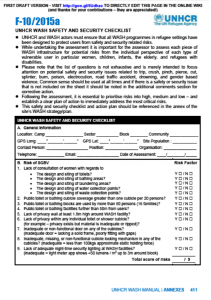
This document has been designed to help UNHCR and WASH actors assess potential WASH related safety and security issues related to trip, crush, pinch, pierce, cut, splinter, burn, poison, electrocution, road traffic accident, drowning, and gender based violence.
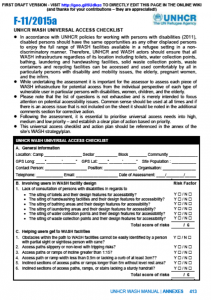
This document has been designed to help UNHCR and WASH actors assess WASH infrastructure for potential access from the individual perspective of each type of vulnerable user in particular persons with disabilities, women, children, and the elderly.
Tags: Accès pour Handicapés, Approvisionnement en Eau, Développement des Stratégies EHA, Douches, Évaluations EHA, Gestion de Programmes EHA, Installations pour la Lessive, Suivi et Evaluation EHA, Thèmes Transversaux, and Toilettes Communautaires. Languages: Anglais. Organisations: UNHCR. Categories: Directives Opérationnelles EHA, Documents de Référence EHA, Formulaires et Outils EHA, and Principes directeurs EHA.
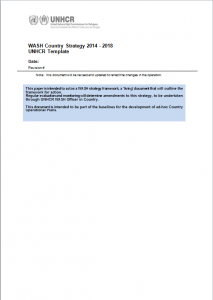
Where required, UNHCR and WASH actors should work together to develop a country level refugee WASH strategy document that clearly describes the refugee context, the baseline WASH situation, WASH coverage, WASH gaps, along with short (6 months), medium (6 months – 5 years) and long-term (>5 years) strategies for each of the WASH sub-sectors and the twelve (12) WASH principles. This template can be used to help produce the Country level WASH Strategy.
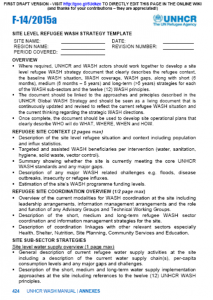
Where required, UNHCR and WASH actors should work together to develop a site level refugee WASH strategy document that clearly describes the refugee context, the baseline WASH situation, WASH coverage, WASH gaps, along with short (6 months), medium (6 months – 5 years) and long-term (>5 years) strategies for each of the WASH sub-sectors and the twelve (12) WASH principles. This template can be used to help produce the site level WASH Strategy.
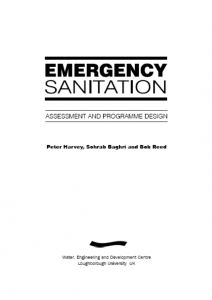
The book Emergency Sanitation: Assessment and programme design has been produced to assist those involved in planning and implementing emergency sanitation programmes. The main focus of the book is a systematic and structured approach to assessment and programme design. It provides a balance between the hardware (technical) and software (socio-cultural, institutional) aspects of sanitation programmes, and links short-term emergency response to long-term sustainability. The book is relevant to a wide range of emergency situations, including both natural and conflict-induced disasters, and open and closed settings. It is suitable for field technicians, engineers and hygiene promoters, as well as staff at agency headquarters.
Tags: Compostage des Excréta, Égouts et Acheminement des Excréta, Évaluations EHA, Gestion de Programmes EHA, Gestion des Excréta, Réutilisation des Excréta / Urine, Suivi et Evaluation EHA, Toilettes Communautaires, Toilettes Familiales, Traitement des Excréments, and Vidange et Transport d'Excréta. Languages: Anglais. Organisations: WEDC. Categories: Directives d'Urgence EHA and Documents de Référence EHA.
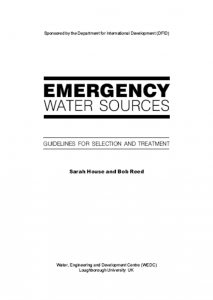
These guidelines have been designed to help those involved in the assessment of emergency water sources to collect relevant information in a systematic way, to use this information to select a source or sources and to determine the appropriate level of treatment required to make the water suitable for drinking.
Tags: Approvisionnement en Eau, Camions Citerne, Collecte des Eaux de Pluie, Contrôle et Suivi de la Qualité de l'Eau, Eaux Souterraines, Évaluations EHA, Forages, Gestion de Programmes EHA, Plans pour la Sécurité en Eau, Pompage d'Eau, Pompe Manuelle, Prospection d'Eau, Protection des Sources, Puits Creusés à la Main, Puits Forés, Réseaux d'Adduction d'Eau, Stockage de l'Eau, Suivi et Evaluation EHA, Traitement de l'Eau, and Traitement de l'Eau au Ménage. Languages: Anglais. Organisations: WEDC. Categories: Directives d'Urgence EHA and Documents de Référence EHA.

The Sphere Handbook is one of the most widely known and internationally recognized sets of common principles and universal minimum standards for the delivery of quality humanitarian response.
Tags: Accès pour Handicapés, Approvisionnement en Eau, Contrôle et Suivi de la Qualité de l'Eau, Coordination EHA, Douches, Droit à l'eau / assainissement, Écoulement des Eaux, Élimination des Eaux Usées, Environnement, Évaluations EHA, Genre, Gestion de l'Hygiène Menstruelle, Gestion de Programmes EHA, Gestion des Déchets Solides, Gestion des Excréta, Installations pour la Lessive, Lavage des Mains au Savon, Lutte Antivectorielle, Plans pour la Sécurité en Eau, Protection, Renforcement des Capacités, Réseaux d'Adduction d'Eau, Santé Publique, Sensibilisation à l'Hygiène, Suivi et Evaluation EHA, Thèmes Transversaux, Toilettes Communautaires, Traitement de l'Eau au Ménage, and Violence Basée sur le Genre. Languages: Anglais. Organisations: SPHERE. Categories: Documents de Référence EHA.
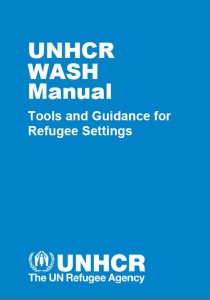
The UNHCR WASH Manual is a comprehensive and authoritative reference document for WASH interventions in refugee settings, built upon the experience of UNHCR and WASH organisations.
Tags: Accès pour Handicapés, Approvisionnement en Eau, Assainissement Total Piloté Par La Communauté, Camions Citerne, Changement de Comportement en Matière d'Hygiène, Collecte des Eaux de Pluie, Compostage des Excréta, Contrôle des Maladies Transmissibles, Contrôle et Suivi de la Qualité de l'Eau, Coordination EHA, Diarrhée Aqueuse, Diarrhée Sanglante, Douches, Droit à l'eau / assainissement, Écoulement des Eaux, Égouts et Acheminement des Excréta, Élimination des Eaux Usées, Évaluations EHA, Forages, Genre, Gestion de l'Hygiène Menstruelle, Gestion de Programmes EHA, Gestion des Décharges, Gestion des Déchets Médicaux, Gestion des Déchets Solides, Gestion des Excréta, Installations Adaptées aux Enfants, Installations pour la Lessive, Lavage des Mains au Savon, Lutte Antivectorielle, Malaria, Plans pour la Sécurité en Eau, Pompage d'Eau, Pompe Manuelle, Prospection d'Eau, Protection, Protection des Sources, Puits Creusés à la Main, Puits Forés, Recyclage, Réutilisation et Réduction des Déchets, Réseaux d'Adduction d'Eau, Réutilisation des Excréta / Urine, Santé et Sécurité, Santé Publique, Sensibilisation à l'Hygiène, Stockage de l'Eau, Suivi et Evaluation EHA, Thèmes Transversaux, Toilettes Communautaires, Toilettes Familiales, Traitement de l'Eau, Traitement de l'Eau au Ménage, Traitement des Excréments, and Vidange et Transport d'Excréta. Languages: Anglais. Organisations: UNHCR. Categories: Documents de Référence EHA.
 Français
Français








